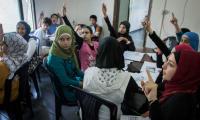Furthering human rights education among youth in Jordan

As a result of the civil war in Syria, the number of Syrians who have settled down in the neighbouring country Jordan, has increased tremendously. The small Middle Eastern country currently hosts more than 1.3 million Syrians, of which 671,148 are registered refugees. The enormous influx of Syrians has strained the Jordanian infrastructure, not least in terms of the provision of education services for Syrian refugee children and their Jordanian host communities.
The Novo Nordisk Foundation recently awarded about DKK 15 million to Danish and international aid organizations. Twenty projects have received funding for humanitarian initiatives and emergency aid in several countries. Among the recipients is the Danish Institute for Human Rights, who will initiate a project in collaboration with the Jordanian National Centre for Human Rights and the University of Saint Joseph, Lebanon.
Empowering vulnerable Syrian and Jordanian youth
The overall purpose of the project is to contribute to the empowerment of vulnerable Syrian and Jordanian youth to be active and rights respecting members of their communities in peaceful and tolerant societies through strengthened human rights education.
The project implies several initiatives, such as documenting the current knowledge, skills and attitudes on human rights among the youth and developing and piloting appropriate human rights training material together with teachers, partners and youth representatives in Jordan. Based on this, the project will provide input to relevant national state authorities and other actors who lead the national curricula reform processes over the next three years.
“The purpose of these grants is to improve health and the prospects of vulnerable communities in areas affected by crises and natural disasters,” says Hanna Line Jakobsen, Head of Social and Humanitarian Grants, Novo Nordisk Foundation.
Cecilia Decara, Chief Adviser and Programme Manage at the Danish Institute for Human Rights, is grateful for the funding. It gives the Institute the opportunity to further the right to education and access to quality education for youth in refugee- and host-communities in Jordan.
Barriers for Syrian and host community youth include lack of empowerment, high dropout rates, violence in schools, gender inequality, inadequate teacher training, and an outdated curriculum and pedagogy.
“Jordan has made efforts to integrate Syrian refugee youth within their education systems. The education systems and the authorities are however extremely challenged on many different levels. With this project I believe we can improve the prospects of children and youth in the region,” Cecilia Decara says.
